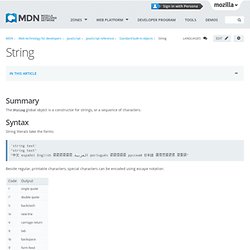

C Document Object Model Recommendations: support claims. The following table indicates what claims are indicated by your user agent regarding the implementations of the W3C Document Object Model Recommendations. A list of W3C DOM Recommendations is available at If you get a year in a cell, your browser does not claim to support the DOM module for a given DOM Level.
The year in the cell is the year of the release of the W3C DOM Recommendation that defines the DOM module. This page does not: test all DOM implementations available in your user agent if more than one are available; It only tests the DOM implementation directly available from the document displayed, i.e. this page. check your user agent claims. Note: The XML and HTML modules require to have support for the core methods. This page uses primarily the W3C DOM Level 1 Recommendation and relies on the HTML 4.01 handling in your user agent.
Prototype. Operator Precedence - MDC Docs. Summary Operator precedence determines the order in which operators are evaluated. Operators with higher precedence are evaluated first. A common example: 3 + 4 * 5 // returns 23 The multiplication operator ("*") has higher precedence than the addition operator ("+") and thus will be evaluated first. Associativity Associativity determines the order in which operators of the same precedence are processed. A OP b OP c Left-associativity (left-to-right) means that it is processed as (a OP b) OP c, while right-associativity (right-to-left) means it is interpreted as a OP (b OP c). A = b = 5; with the expected result that a and b get the value 5.
Table The following table is ordered from highest (0) to lowest (18) precedence. Contributors to this page:Readams, rajashree396, kscarfone, sonali6105, Yuichirou, MattBrubeck, Joshua-S, rvighne, Potappo, Biesi, DeepThought, Sheppy, openjck, SlexAxton, Ptak82, PointedEars, Wladimir_Palant, jackblack, Yuki Konno, ethertank, Callek, Bergi, BenoitL, Maian. String - MDC Docs. Summary The String global object is a constructor for strings, or a sequence of characters.

Syntax String literals take the forms: 'string text' "string text" "中文 español English हिन्दी العربية português বাংলা русский 日本語 ਪੰਜਾਬੀ 한국어" Beside regular, printable characters, special characters can be encoded using escape notation: Or, using the String global object directly: String(thing) new String(thing) Parameters thing Anything to be converted to a string. Description Strings are useful for holding data that can be represented in text form. Character access There are two ways to access an individual character in a string. Return 'cat'.charAt(1); The other way (introduced in ECMAScript 5) is to treat the string as an array-like object, where individual characters correspond to a numerical index: return 'cat'[1]; For character access using bracket notation, attempting to delete or assign a value to these properties will not succeed.
Comparing strings console.log(eval(s2.valueOf())); Properties Methods. JavaScript and HTML DOM Reference. JavaScript Tutorial. JSLint, The JavaScript Code Quality Tool.